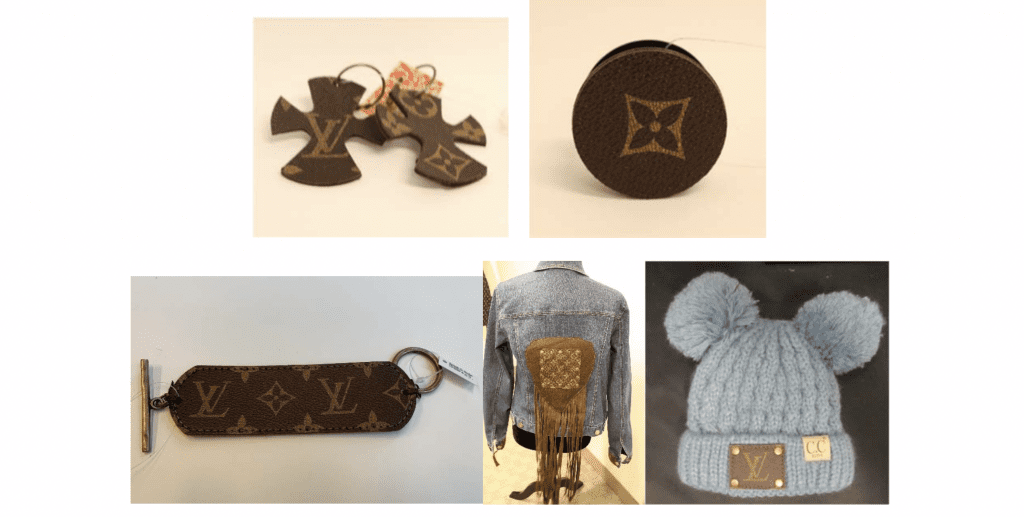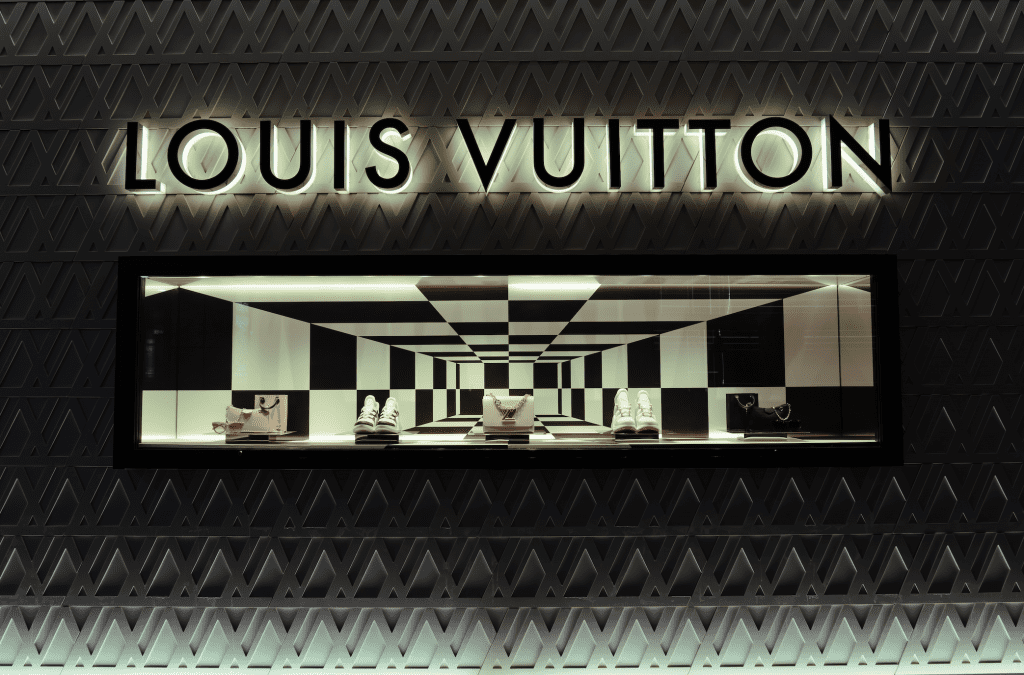A prolific wholesaler in the business of “upcycling” has quietly agreed to settle a lawsuit waged against it by Louis Vuitton last year for allegedly engaging in trademark counterfeiting, infringement, and dilution by “willfully” co-opting Louis Vuitton’s famous trademarks to create new apparel and accessories. In a filing with the U.S. District Court for the Southern District of Texas last month, Sandra Ling Designs, Inc. and its owner Sandra Ling offered to allow a judgment to be entered against them, including a $603,000 sum and a permanent injunction, and also moved to drop the counterclaims they lodged against Louis Vuitton in order to bring the case to a close.
The case got its start in February 2021, when Louis Vuitton filed suit against Sandra Ling Designs, Inc. and Ms. Ling (collectively, “SLD”), alleging that the two defendants were running afoul of federal trademark law by offering up apparel, handbags, and accessories made from “purportedly authentic pre-owned” Louis Vuitton goods that they altered by “disassembl[ing] and deconstruct[ing]” to craft new products and/or by “adding decorations, such as tassels, stones, or beading.” While the goods continued to “prominently” bear Louis Vuitton trademarks, the luxury goods titan argued that the “fundamental alterations” made by SLD turned the allegedly authentic Louis Vuitton products into ones that “do not meet Louis Vuitton’s strict quality standards,” and thus, are “no longer genuine Louis Vuitton products.”
Upcycling & the First Sale Doctrine
By focusing on the extensiveness of the alterations, which resulted in products that “no longer attain the aesthetic or quality of authentic Louis Vuitton items,” Louis Vuitton appeared to be looking to proactively chip away at any first sale doctrine arguments that the wholesaler defendants might raise, as first sale protections do not apply when an unauthorized party sells products that are “materially different” from those sold by the brand and/or its authorized retailers. Unsurprisingly, SLD responded to Louis Vuitton’s lawsuit by claiming that its activities fall neatly within the realm of “upcycling,” and thus, it should be shielded from liability by the first sale doctrine.
In its September 2021 answer, SLD admitted that “without specific authorization” from Louis Vuitton, it “designs, makes, and sells wholesale upcycled goods,” which it constructs from “genuine, authentic, pre-owned (i.e., used/discarded/salvaged) LV items, which SLD typically dissembles and/or deconstructs for recycling or upcycling, and that those materials from those LV items can and often do show marks or portions of marks which LV claims are its trademarks that LV imprinted or imbedded or otherwise permanently formed or placed in the materials.”

While the defendants made some admissions in this vein in their answer, they denied that consumers would “readily or reasonably think that the upcycled goods are sourced from or sponsored or approved by Louis Vuitton … since they are upcycled (or recycled) goods made from genuine, authentic, used and discarded products.” Also part of the reason why consumers were unlikely to be confused about the nature/source of its wares, per SLD: Its inclusion of language with “each upcycled good,” in which it disclaims any affiliation with or connection to Louis Vuitton and states that “the purchaser of the upcycled product ‘understands and acknowledges that the product is not a Louis Vuitton product.’”
In addition to answering Louis Vuitton’s complaint, SLD lodged claims of its own, seeking a declaration from the court that its sales of the “upcycled” goods amounts to “fair use of LV’s trademarks, and does not constitute an infringement of LV’s trademarks,” arguing that Louis Vuitton, “through misrepresentation and improper use of its trademarks, sought to prevent [SLD] from making and selling upcycled goods comprising material salvaged from used and discarded but genuine and authentic LV products.” SLD also set out a claim of tortious interference with existing and prospective business relations under Texas law on the basis that Louis Vuitton “willfully and intentionally interfered with [its] ongoing and potential business relationships.”
Fast forward to last month, and the parties appear to be winding down the suit, with counsel for Louis Vuitton accepting SLD’s offer of judgment, and SLD moving to drop its counterclaims.
A String of Cases
The Sandra Ling case comes amid a rise in customization and upcycling-centric battles, as luxury goods companies and sportswear giants, alike, look to crack down on what they have characterized as attempts by third parties to piggyback on – and profit from – the appeal of their brands by making unauthorized use of their famous marks. Nike, for example, has pursued such claims against customizers of its famous footwear, including MSCHF, while Rolex has taken on parties like La Californienne over its sale of modified watches bearing Rolex trademarks. Beyond that, Ralph Lauren filed suit against VNDS Los Angeles a couple of years ago over its sale of “retro inspired custom apparel and accessories” made from Ralph Lauren products.
And still yet, Chanel is currently facing off against Shiver + Duke over the defendant jewelry company’s sale of jewelry crafted from allegedly authentic Chanel buttons, setting out claims of trademark infringement, unfair competition, and trademark dilution against the company early last year.
These cases raise some interesting questions, as companies appear to be actively testing the bounds of their rights in order to exert control over where, how, and by whom products bearing their names and other trademarks are sold. This includes secondary market offerings, with luxury brands – and even more mass-market entities like Nike and co. – grappling with trademark issues as a result of the rise of the burgeoning resale market. At a high level, these cases also pit circularity/sustainability-related issues – which are commonly cited by upcyclers – against brand enforcement issues, which companies argue are a critical element in their ability to maintain robust trademark rights and keep the goodwill associated with those marks (and corresponding pricing power) intact.
With the exception of the Hamilton watch case, for instance, which saw the U.S. Court of Appeals for the Second Circuitdetermine that defendant Vortic LLC did not run afoul of trademark law by selling restored and modified watches consisting of original Hamilton parts and bearing Hamilton’s branding (as Vortic’s use of the Hamilton trademark is not likely to confuse consumers), most of the upcycling cases have not provided much guidance by way of substantive decisions from the courts.
But even without a long list of decisions, these cases provide some insight, as they drive home the point that even with the first sale doctrine at play, upcycling is not always fair game. Whether a company can upcycle goods without landing on the opposite end of lawsuits waged by luxury titans and sportswear behemoths will depend not only on the state of the resold product, itself, but also the terms/conditions in which it is offered up for sale, and in many cases, may call into question potential disclosures or disclaimers made by the upcyclers, and their effectiveness at lessening the potential for confusion.
Moving forward, a rising number of companies – from Patagonia to brands like Stella McCartney to Louis Vuitton – are upcycling their own wares and archival materials in order to reduce their environmental impact. Such in-house efforts will inevitably raise the stakes even further on the upcycling front, meaning more litigation will likely come into play.
The case is Louis Vuitton Malletier v. Sandra Ling Designs, Inc., et al., 4:21-cv-00352 (S.D.Tex.).











